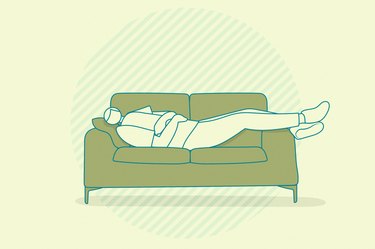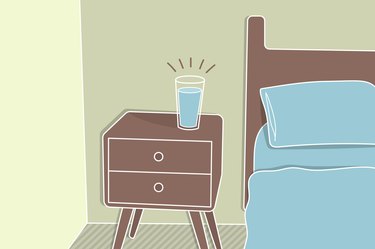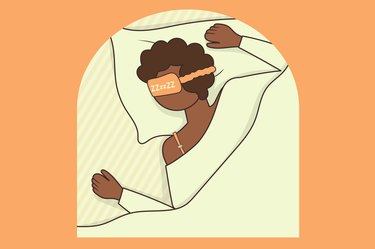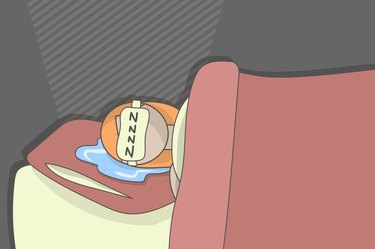
Just like an ice cream cone or a freshly baked chocolate chip cookie, the occasional Sunday sofa siesta can feel like a real treat. But sleeping on the couch every night? It's more the equivalent of eating the whole pint or box: Too much of a good thing — that can add up to problems down the road.
Even though the couch might seem conducive to nodding off, making it your go-to snooze space isn't good for your sleep or your spine, experts say. Here's a look at what can happen when you do it on the regular, plus what you can do to break the habit.
Video of the Day
Video of the Day
Is It Really Easier to Fall Asleep on the Couch?
Your couch isn't actually a more sleep-friendly space than your bed. (We'll talk about all the reasons why in a minute.) But it can sometimes feel that way.
"It's the end of the day, you're home from work, you've eaten dinner and you have the TV on and you just fall asleep because you're laying down and you're tired," says Kunal Kumar, MD, medical director of the Sleep Center at Einstein Medical Center in Philadelphia.
Your brain can also come to associate the couch with sleep if sofa-snoozing is a regular thing for you. When that happens, you might be prone to conking out more quickly whenever you plop down on the couch. Conversely, your brain's association of the bed with sleep could weaken, potentially leading to insomnia and worsened sleep quality once you tuck yourself under the sheets.
Problems With Sleeping on the Couch
Even though the couch can feel like the space that lulls you to sleep like no other, there are lots of reasons to avoid letting it become your impromptu bedroom. Some factors to consider:
You May Nod Off Earlier Than Your Planned Bedtime
Prime couch-sleeping time might be eight or nine o'clock at night, after you've had dinner and are settled on the sofa to catch up on your favorite show, Dr. Kumar points out. Problem is, eight or nine o'clock isn't actually bedtime — you're really just taking a nap right before you're supposed to turn in for the night.
"So when you wake up an hour or two later and go to your bedroom, you end up not being tired because you were just sleeping," he says.
Your Sleep Will Probably Get Disrupted
Bedrooms are supposed to be dark and quiet, but your couch's location is probably anything but. "There are interruptions from the TV, lights and other people, all of which can wake you up," Dr. Kumar says. And those little wake-ups can cause your sleep to be lighter, more fragmented and less restorative — not the recipe for deep sleep.
Your Back and Neck Might Hurt
Couches are designed for sitting, not laying down. Do the latter for seven or eight hours, and there's a good chance you'll wake with stiffness or pain in your neck, back, shoulders or hips, says Ronald Barton Tolchin, DO, director of the Spine Center with Baptist Health Miami Neuroscience Institute.
The fact that couches tend to be shorter in length than beds can also be problematic. "You might need to bend your knees, which can cause hamstring tightness and lead to further back pain," Dr. Tolchin adds.
Those effects won't just leave you uncomfortable when you get up. If the aches linger into the evening, they'll end up making it even harder for you to fall asleep the next night, Dr. Kumar says.
Your Relationship Might Take a Hit
There's no right or wrong way to be in a relationship, and some couples thrive by sleeping in separate beds. But in some cases, couch-snoozing might speak to a larger issue that's happening between you and your partner.
"If a relationship is missing emotional or sexual intimacy, then sleeping on the couch may exacerbate the disconnection that is occurring," says Alison Gomez, LMFT, a relationship therapist in Bakersfield, California. (On the other hand, if you feel connected to your partner and your partner feels supported, "then do whatever sleeping arrangement works best for you and your family," she adds.)
How to Break the Habit
If you tend to fall asleep on the couch unintentionally, try putting stopgaps into place that make it harder to nod off. Keep the lights around the couch bright, make it a rule that you have to stay sitting up or even ask others to wake you up if you start to doze.
Then when you feel yourself getting tired, move to your bedroom to actually go to sleep. (If you start to feel more awake, try a quiet activity like this to settle back down.) Over time, your brain will start to associate your bed with sleeping instead of the couch, Dr. Kumar says.
So, How Bad Is It Really to Fall Asleep on the Couch at Night?
Snoozing on the couch is a bad habit that can wreck your sleep and make you physically uncomfortable. Doing it once in a while is fine, says Dr. Kumar, especially in situations where you don't have a choice, like if you're traveling, you're letting a houseguest use your bed or your sleeping partner is sick.
In those cases, do your neck and shoulders a favor by bringing your pillow down to the couch rather than using a couch pillow. (Then try these stretches in the morning.) And as soon as things get back to normal, go right back to sleeping in your bed.
"Don't make sleeping on the couch a habit," Dr. Kumar says.
Is this an emergency? If you are experiencing serious medical symptoms, please see the National Library of Medicine’s list of signs you need emergency medical attention or call 911.






